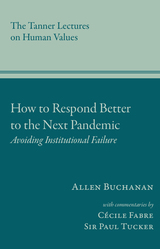
The third edition of Ethics & International Affairs provides a fresh selection of classroom resources, ideal for courses in international relations, ethics, foreign policy, and related fields. Published with the Carnegie Council for Ethics in International Affairs, this collection contains some of the best contemporary scholarship on international ethics, written by a group of distinguished political scientists, political theorists, philosophers, applied ethicists, and economic development specialists. Each contributor explores how moral theory can inform policy choices regarding topics such as war and intervention, international organizations, human rights, and global economic justice. This book provides an entry point into these key debates and offers a platform for further discussion.
Published in cooperation with the Carnegie Council for Ethics in International Affairs

In How to Respond Better to the Next Pandemic Allen Buchanan argues that, contrary to widespread opinion, the primary cause of flawed COVID-19 policy was not defective leadership, but rather institutional failure. Decisions were made through processes that lacked the most basic safeguards against the large-institution “yes-man” and group-think phenomena and included virtually no provisions for holding decision makers accountable. More fundamentally, policy makers did not fulfill the crucial duty to provide plausible public justifications for their decisions. They disguised the fact that scientific opinion was divided on the appropriateness of the policies they endorsed and labeled those who disagreed with them as anti-scientific. In some cases, they responded to criticism, not by engaging it on the issues, but by branding their critics as quacks.

Mental illness is the poor, and somehow "damaged," cousin to physical ailments in the eyes of too many in our society. Compare the difference in how people would respond to someone who had fallen and broken their leg on the street, to how most react to those mentally ill among us, on those same streets, who spend their winters on steam grates and forage for food in dumpsters. Rationing Sanity is a provocative analysis of the mental health care system in the United States, dealing with issues of justice and access to mental health care.
How should a decent society, affluent but facing many serious calls on its resources, best care for citizens afflicted with severe and persistent mental illnesses? James Lindemann Nelson brings together, for the first time, scholars of the ethics of mental health care and top managed care policy analysts to address this crucial problem. Rationing Sanity integrates those perspectives with the thoughtful practice-based experience of physicians well versed in the actual care of people with emotional and behavioral problems. Over a period of years, the contributors met face-to-face to engage each other on the ethics of managed mental health care—the result is a unique, collaborative effort that provides a wealth of important new insights on not only how Americans can readjust their attitudes toward the mentally ill—but also how we may find more just and humane treatment for those afflicted.
READERS
Browse our collection.
PUBLISHERS
See BiblioVault's publisher services.
STUDENT SERVICES
Files for college accessibility offices.
UChicago Accessibility Resources
home | accessibility | search | about | contact us
BiblioVault ® 2001 - 2024
The University of Chicago Press









